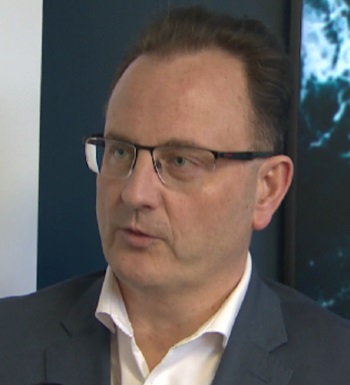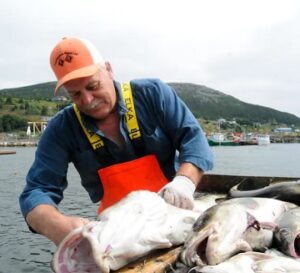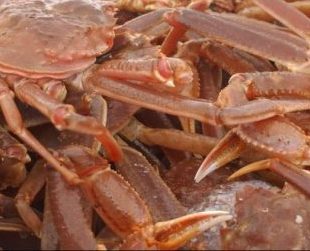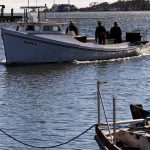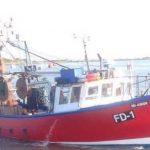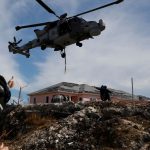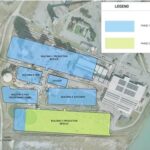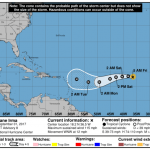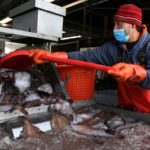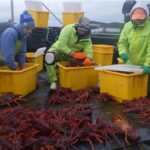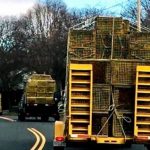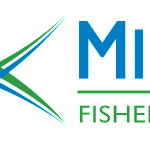Tag Archives: Fish harvesters
YEAH!!! Newfoundland fish harvesters crash news conference to demand reinstating of cod moratorium
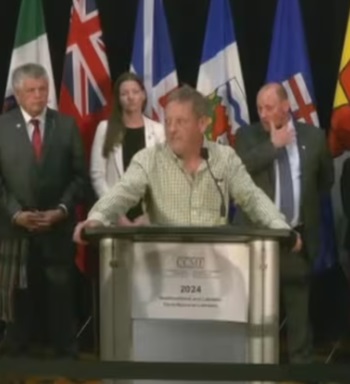 Fish harvesters in Newfoundland crashed the podium at a meeting of Canada’s environment ministers in St. John’s on Wednesday, demanding a meeting with Prime Minister Justin Trudeau over the federal government’s decision to reopen the commercial cod fishery in Newfoundland and Labrador. Moments before the start of the news conference, which was to detail two days of meetings of the Canadian Council of Environment Ministers, Newfoundland and Labrador Environment Minister Bernard Davis was interrupted by a loud siren. Glen Winslow, a St. John’s fish harvester, then walked up to meet Davis at the podium from a group of around 15 protesters. “Sorry we got to do this, my buddy, but this is too important to Newfoundland and Labrador,” Winslow said to Davis over the news conference’s microphone while the other ministers watched on. more, >>CLICK TO READ<< 17:43
Fish harvesters in Newfoundland crashed the podium at a meeting of Canada’s environment ministers in St. John’s on Wednesday, demanding a meeting with Prime Minister Justin Trudeau over the federal government’s decision to reopen the commercial cod fishery in Newfoundland and Labrador. Moments before the start of the news conference, which was to detail two days of meetings of the Canadian Council of Environment Ministers, Newfoundland and Labrador Environment Minister Bernard Davis was interrupted by a loud siren. Glen Winslow, a St. John’s fish harvester, then walked up to meet Davis at the podium from a group of around 15 protesters. “Sorry we got to do this, my buddy, but this is too important to Newfoundland and Labrador,” Winslow said to Davis over the news conference’s microphone while the other ministers watched on. more, >>CLICK TO READ<< 17:43
Newfoundland and Labrador Harvesters Call for Reestablishment of Northern Cod Stewardship Fishery
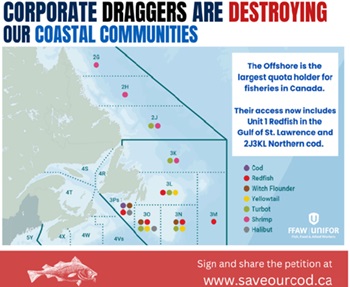 St. John’s, NL – On the 32nd Anniversary of the historic Northern cod moratorium, fish harvesters in Newfoundland and Labrador are calling for an immediate return of the Northern Cod Stewardship Fishery, following an announcement from the federal government earlier this week that they plan to return the important species to commercial status and allow offshore draggers to access the stock. “As a province, we are demanding the federal government return our important northern cod resource back to a stewardship fishery and ensure the species is protected as it continues to rebuild,” says FFAW-Unifor President Greg Pretty. more, >>CLICK TO READ<< 10:03
St. John’s, NL – On the 32nd Anniversary of the historic Northern cod moratorium, fish harvesters in Newfoundland and Labrador are calling for an immediate return of the Northern Cod Stewardship Fishery, following an announcement from the federal government earlier this week that they plan to return the important species to commercial status and allow offshore draggers to access the stock. “As a province, we are demanding the federal government return our important northern cod resource back to a stewardship fishery and ensure the species is protected as it continues to rebuild,” says FFAW-Unifor President Greg Pretty. more, >>CLICK TO READ<< 10:03
Newfoundland fisherman says police broke his leg during protest that delayed budget
 Richard Martin is spending this year’s fishing season on land after he says a Royal Newfoundland Constabulary officer broke his left leg in three places during a protest last month that shut down the provincial legislature. The 52-year-old fisherman had just seen two officers on horseback approaching fish harvesters demonstrating outside the legislature on the morning of March 20, the day Newfoundland and Labrador’s Liberal government was expected to deliver its annual budget. Martin doesn’t like horses — he was kicked by one as a child, he said in an interview Tuesday — and he was moving to edge of the crowd to get away. more, >>CLICK TO READ<< 09:50
Richard Martin is spending this year’s fishing season on land after he says a Royal Newfoundland Constabulary officer broke his left leg in three places during a protest last month that shut down the provincial legislature. The 52-year-old fisherman had just seen two officers on horseback approaching fish harvesters demonstrating outside the legislature on the morning of March 20, the day Newfoundland and Labrador’s Liberal government was expected to deliver its annual budget. Martin doesn’t like horses — he was kicked by one as a child, he said in an interview Tuesday — and he was moving to edge of the crowd to get away. more, >>CLICK TO READ<< 09:50
Fisherman slammed to the ground by a police officer now ‘considering legal option’
 The fisherman who was left with a broken hip after he participated in a blockade last month is now “considering legal options” against the Royal Newfoundland Constabulary (RNC), according to a report. Richard Martin, 52, was “slammed to the ground by a police officer,” according to a CBC report. The incident happened on March 20, when hundreds of seafood harvesters were blockading Confederation Building in St. John’s, preventing public service workers and politicians from accessing the sprawling complex. more, >>CLICK TO READ<< 15:17
The fisherman who was left with a broken hip after he participated in a blockade last month is now “considering legal options” against the Royal Newfoundland Constabulary (RNC), according to a report. Richard Martin, 52, was “slammed to the ground by a police officer,” according to a CBC report. The incident happened on March 20, when hundreds of seafood harvesters were blockading Confederation Building in St. John’s, preventing public service workers and politicians from accessing the sprawling complex. more, >>CLICK TO READ<< 15:17
ASP attempts to post price to break ranks, Commitee turns down offer that further erodes harvester share
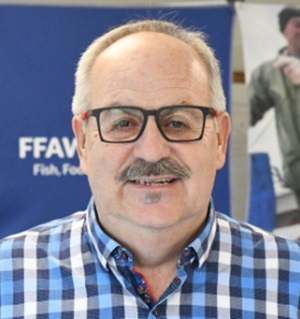 Companies continue to spread misinformation in an effort to cause controversy and mistrust between fellow harvesters. “Today, ASP relayed a verbal offer via our Mediator and before our Committee was event able to convene, plants began to advise harvesters that a price had been set for them to go fishing. This is the equivalent of posting a price without a collective agreement. And it’s completely, unequivocally, unacceptable,” says FFAW-Unifor President Greg Pretty. “Harvesters are advised not to fish until an agreement is signed, and the only source that will come from is the Union’s official channels,” Pretty says. more, >>click to read<< 06:43
Companies continue to spread misinformation in an effort to cause controversy and mistrust between fellow harvesters. “Today, ASP relayed a verbal offer via our Mediator and before our Committee was event able to convene, plants began to advise harvesters that a price had been set for them to go fishing. This is the equivalent of posting a price without a collective agreement. And it’s completely, unequivocally, unacceptable,” says FFAW-Unifor President Greg Pretty. “Harvesters are advised not to fish until an agreement is signed, and the only source that will come from is the Union’s official channels,” Pretty says. more, >>click to read<< 06:43
Accusing union of refusing all offers, ASP warns crab tie-up will soon have an economic whammy
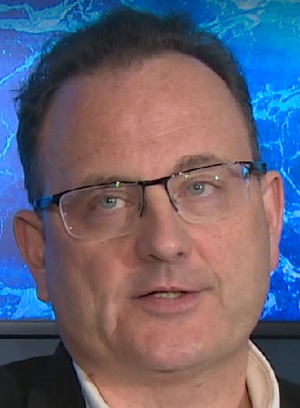 Association of Seafood Producers executive director Jeff Loder says the current crab tie-up is getting to a point where it is going to negatively affect the market for the rest of the season — and other fisheries after that. It’s been nearly a week since the snow crab season was scheduled to begin. Fish harvesters have tied up their boats, however, refusing to fish under the pricing formula that an independent panel set just before the start of the season. Loder said it’s lining up to be a repeat of last season, in which harvesters tied up their boats for six weeks. “We are now reaching the point where [we] were to last year where there will be negative implications if the crab fishery does not start,” he told reporters Thursday. Video, more, >>click to read<< 17:43
Association of Seafood Producers executive director Jeff Loder says the current crab tie-up is getting to a point where it is going to negatively affect the market for the rest of the season — and other fisheries after that. It’s been nearly a week since the snow crab season was scheduled to begin. Fish harvesters have tied up their boats, however, refusing to fish under the pricing formula that an independent panel set just before the start of the season. Loder said it’s lining up to be a repeat of last season, in which harvesters tied up their boats for six weeks. “We are now reaching the point where [we] were to last year where there will be negative implications if the crab fishery does not start,” he told reporters Thursday. Video, more, >>click to read<< 17:43
Crab tie-up means plant workers turn to income support, says Opposition critic
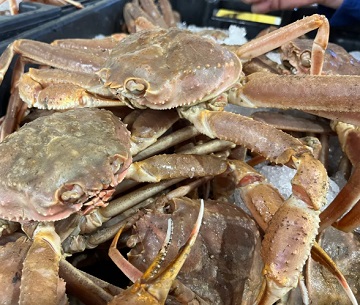 After weeks of protesting, including shutting down Confederation Building, fish harvesters scored big with concessions on who they could sell their catches to. The situation soured soon after, when the new crab price formula was revealed. Put forward by the Association for Seafood Producers, the floor price is set at $2.60 per pound and the harvester’s share is set at 37 per cent of market value above $8 per pound. Harvesters are refusing to go out on the water with the current formula. Bonavista MHA Craig Pardy called the situation unfortunate and said he’d hoped to avoid a repeat of last year, when there was a six-week delay to the start of the season. Pardy said he’s heard that more than 50 Bonavista plant workers have had their EI support elapse and are now without income. more, >>click to read<< 14:02
After weeks of protesting, including shutting down Confederation Building, fish harvesters scored big with concessions on who they could sell their catches to. The situation soured soon after, when the new crab price formula was revealed. Put forward by the Association for Seafood Producers, the floor price is set at $2.60 per pound and the harvester’s share is set at 37 per cent of market value above $8 per pound. Harvesters are refusing to go out on the water with the current formula. Bonavista MHA Craig Pardy called the situation unfortunate and said he’d hoped to avoid a repeat of last year, when there was a six-week delay to the start of the season. Pardy said he’s heard that more than 50 Bonavista plant workers have had their EI support elapse and are now without income. more, >>click to read<< 14:02
FFAW blasts price-setting panel after it sides with ASP on crab-pricing formula
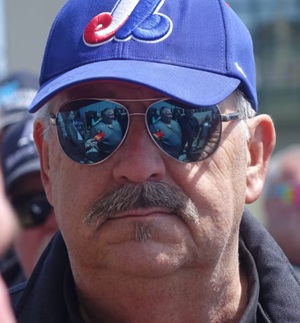 With the time-sensitive snow crab season set to begin in a few days, fish harvesters in Newfoundland and Labrador are once again talking about tying up their boats due to the price of crab. The province’s price-setting panel sided with the Association of Seafood Producers on Monday evening, setting a price floor of $2.60 per pound with the ability go up as market factors change. The panel rejected a formula proposed by the Food, Fish & Allied Workers union, which was closely tied to the formula suggested by an independent report at the end of last season. “There was a better way to do this,” said FFAW president Greg Pretty. “The work was already done by Glen Blackwood in his report. The Blackwood formula provided a way for harvesters to be paid a fair market share, but that was tossed aside for a formula that is not tied to information harvesters can trust.” more, >>click to read<< 11:26
With the time-sensitive snow crab season set to begin in a few days, fish harvesters in Newfoundland and Labrador are once again talking about tying up their boats due to the price of crab. The province’s price-setting panel sided with the Association of Seafood Producers on Monday evening, setting a price floor of $2.60 per pound with the ability go up as market factors change. The panel rejected a formula proposed by the Food, Fish & Allied Workers union, which was closely tied to the formula suggested by an independent report at the end of last season. “There was a better way to do this,” said FFAW president Greg Pretty. “The work was already done by Glen Blackwood in his report. The Blackwood formula provided a way for harvesters to be paid a fair market share, but that was tossed aside for a formula that is not tied to information harvesters can trust.” more, >>click to read<< 11:26
Union and Province Come to Agreement on ‘Free Enterprise’
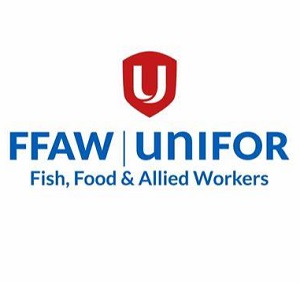 Today, the Provincial Government has released a letter detailing the provincial changes taking place to increase provincial processing capacity and give harvesters more opportunities to sell their catch. The agreement, which stemmed from protests held last month in St. John’s and around the province, responds to harvesters’ demands for free enterprise. “We are pleased with the amount of collaboration and consultation that has taken place to produce the letter from Minister Loveless today. The Minister took the concerns of harvesters seriously and has made tangible changes that will have positive impacts for fish harvesters all over the province,” says FFAW-Unifor President Greg Pretty. “Importantly, I want our plant worker members to know you are not forgotten about, and these changes are expected to have minimal-to-no impact on existing jobs,” Pretty says. more, >>click to read<< 16:19
Today, the Provincial Government has released a letter detailing the provincial changes taking place to increase provincial processing capacity and give harvesters more opportunities to sell their catch. The agreement, which stemmed from protests held last month in St. John’s and around the province, responds to harvesters’ demands for free enterprise. “We are pleased with the amount of collaboration and consultation that has taken place to produce the letter from Minister Loveless today. The Minister took the concerns of harvesters seriously and has made tangible changes that will have positive impacts for fish harvesters all over the province,” says FFAW-Unifor President Greg Pretty. “Importantly, I want our plant worker members to know you are not forgotten about, and these changes are expected to have minimal-to-no impact on existing jobs,” Pretty says. more, >>click to read<< 16:19
Fisheries protests give rise to a new John Efford — but what’s next for the unofficial leader?
 Until this month, the general public would have associated Efford’s name with his late father — the former fisheries minister who was a firebrand in his own right. But here was the younger Efford, a fisherman from Port de Grave, standing in the back of a pickup truck with a group of followers gathered in front of him. He had led them through two days of intense protests outside the house of government, and now he was the one holding the megaphone — not Fish, Food and Allied Workers union president Greg Pretty, nor FFAW treasury-secretary Jason Spingle. “Thank Jesus we’ve finally got some leadership!” a fisherman yelled from the crowd. “Isn’t it about time?” Efford quipped, garnering cheers. photos, video, more, >>click to read<< 06:16
Until this month, the general public would have associated Efford’s name with his late father — the former fisheries minister who was a firebrand in his own right. But here was the younger Efford, a fisherman from Port de Grave, standing in the back of a pickup truck with a group of followers gathered in front of him. He had led them through two days of intense protests outside the house of government, and now he was the one holding the megaphone — not Fish, Food and Allied Workers union president Greg Pretty, nor FFAW treasury-secretary Jason Spingle. “Thank Jesus we’ve finally got some leadership!” a fisherman yelled from the crowd. “Isn’t it about time?” Efford quipped, garnering cheers. photos, video, more, >>click to read<< 06:16
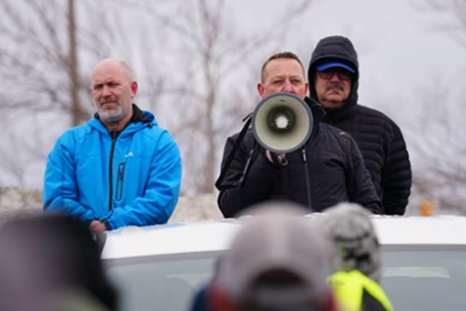
“We got ‘er done” – Fish harvesters reach deal with N.L. government to allow catch to be sold to outside buyers
John Efford Jr. fought back tears as he announced the news to hundreds of fish harvesters standing before him — they’d struck a deal with the Newfoundland and Labrador government to end days of protests. According to Efford — the de facto protest leader — and members of the fisheries union, the provincial government has agreed to let fish harvesters sell their catch to buyers from outside the province, regardless of species. They also said they have commitments on moving caps on processing to promote competition within the industry. “We got ‘er done,” Efford told reporters afterward. “Free enterprise for every species.” more, >>click o read<< 13:22

N.L. inshore crab boats accuse Royal Greenland of giving them the cold shoulder
In a crab fishing season that has been contentious from the start, allegations continue to be levelled by Newfoundland and Labrador fish harvesters against processing companies. The latest accusation is against Royal Greenland, the Danish-owned company that owns three processing plants in the province. A handful of harvesters took to social media in recent days, posting on the Fishermen’s Forum Facebook Page, that Royal Greenland has been refusing to buy crab from some boats in the under 40 ft fleet. However, Simon Jarding, manager of Royal Greenland operations in Newfoundland and Labrador, says those allegations are not accurate. >click to read< 12:21
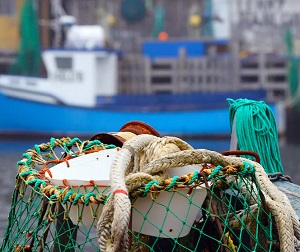
Governments and bureaucrats can fix the N.L. inshore fishery by consulting directly with harvesters
In 1992, a government of Canada MP loudly responded to demonstrators by saying, “I didn’t take the fish from the God damn water.” In 2023, a government of Newfoundland and Labrador MHA told demonstrators, “There is nothing I can do about fish pricing.” Those two statements are indicative of, past and present, attitudes of politicians toward the N.L. fishery. In 1992, the northern cod fishery was shut down because of lack of cod to harvest and in 2023 the industry is being shut down because of issues around pricing. For a few years now, fish harvesters have been pointing out problems with the price-setting system but those in control ignored their concerns and nothing was done. >click to read< by Harvey Jarvis 11:05

Good Indicators for Capelin Health, Despite DFO’s Doubling Down on Doom and Gloom
ST. JOHN’S, NL – Following DFO’s technical briefing on the 2J3KL capelin stock today, fish harvesters are optimistic that more favourable environmental conditions could lead to stock growth. “FFAW-Unifor is not surprised with the tone of today’s technical briefing by DFO Science, which have been consistently negative, irrespective of the data,” says FFAW-Unifor President Greg Pretty. “DFO Science is supposed to be an unbiased, transparent, and evidence-based in their approach. But most of them don’t spend more than a day on the water each year. They don’t see or appreciate the qualitative observations professional fish harvesters provide, and how we can support more robust and reliable data collection for capelin and other species. Instead of contributing to a productive relationship and more informed stock assessments, we have government scientists whose sole objective is to shut commercial fisheries down, regardless of facts,” says Dennis Chaulk, fish harvester from Bonavista Bay with over 28 years of experience on the water. >click to read< 19:17
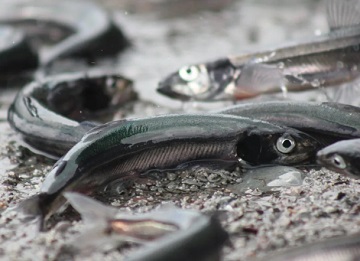
Positive signs in newest capelin stock assessment, but the tiny fish is still in the critical zone
“The capelin were in very good condition in the fall. That meant they’re longer and heavier than average. There’s lots of zooplankton, especially large zooplankton in the ecosystem,” said Hannah Murphy, a DFO research scientist and lead stock assessor. “We also had an increase in our larval abundance index this year, which is great. Larval survival is related to recruitment in capelin, so the more larvae we have and the more that survive, it’s better for the capelin stock.” Murphy said a full capelin acoustic survey happened over 2022, the first since 2019 due to the pandemic in 2020 and vessel availability in 2021. But the positivity ended there. This year, for the first time, the DFO has come up with a limit reference point for capelin. It’s set at 640 kilotons, the weight of fish in the water, and marks the boundary between the cautious and critical zones. >click to read< 17:32
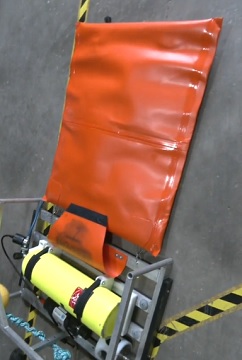
Innovative ropeless fishing gear helps prevent whale entanglements
When fishing zones get closed down due to whale sightings, fish harvesters now have a new place to turn. Can Fish is a program set up by the Canadian Wildlife Federation to allow fishers to test out and use groundbreaking ropeless technology for free. The North Atlantic right whale is one of many marine species being impacted by the changing ocean temperatures in a warming world. The whales have been swimming northward moving from the Bay of Fundy to the Gulf of St. Lawrence,,, The Canadian Wildlife federation is trying to lessen this risk by popularizing the use of ropeless fishing gear through its newly introduced Can Fish program. At a warehouse in Halifax, Nova Scotia, fish harvesters can show up and borrow innovative ropeless fishing gear for free. The catch? These fishers need to provide data collected as they use the innovative technology in order to help build future designs of the equipment. Video, photos, >click to read< 17:30
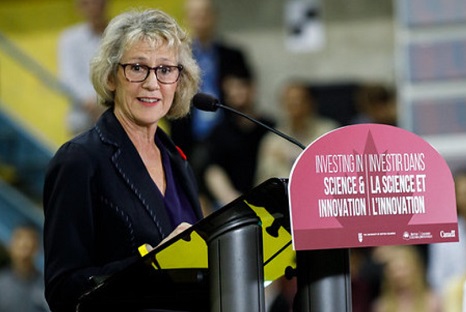
Harvesters Warn of ‘Dire Effects’ as Minister Aims to Protect Fish Stocks from Climate Disruption
A recent appearance by Fisheries Minister Joyce Murray at an industry annual meeting has set off a sea squall of controversy, with harvesters and unions warning of the “dire social and economic effects” of federal catch limits and Murray stressing her interest in keeping fish stocks sustainable in an era of climate disruption. The unions representing fish harvesters on Canada’s east and west coasts claim her remarks to the annual general meeting of the Canadian Independent Fish Harvesters Federation (CIFHF) reflected a “singular focus on ocean conservation” at the cost of workers whose livelihoods rely on the fishery industry. >click to read< 15:38
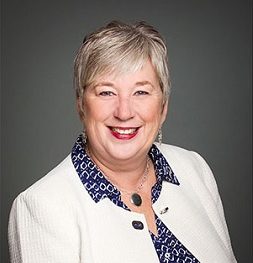
Here’s how to get a piece of $62.5 million in fish processors’ Coronavirus aid
It’s been two months since the federal government rolled out a $62.5-million aid package to support seafood processors affected by Coronavirus, and a $469 million program to aid fish harvesters. So far no one has seen a cent of funding from either package. Today, June 16, seafood processing companies are a little closer. Bernadette Jordan, Minister of Fisheries and Oceans Canada, announced details of how the $62.5 million from the Canadian Seafood Stabilization Fund (CSSF) will be divvied up across Canada, and how to apply. Of the $62.5 million, Atlantic Canada gets the lions’ share — $38.1 million. Seafood processors in Quebec and Western Canada will also get a share of CSSF. >click to read< 14:48
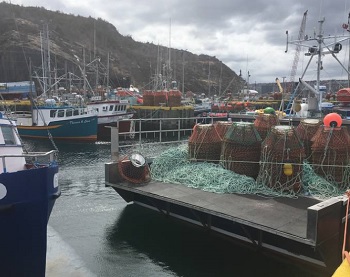
Coronavirus: A fisherman’s daughter’s perspective
I am a fisherman’s daughter who is very aware of the beauty and the dangers of the ocean. Fishing isn’t for everyone — it is a physical, dangerous, high-risk profession in which generations of fishers have gone out on the water and, all too often, not come home. The fishery is one of Newfoundland and Labrador’s many highly dependent resource sectors employing thousands of people directly and indirectly. This year the obstacles facing this sector are beyond what any industry should have to deal with on their own. Since mid-March, fish harvesters were deeply concerned about the potential impact of COVID-19. Safety was and continues to be top priority as it is impossible to social distance while working in a fishing boat. Meagan Careen, St. Bride’s>click to read< 17:12
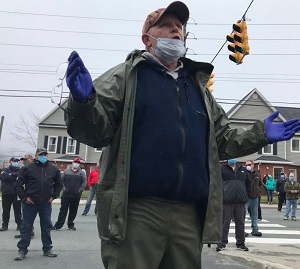
Protesting fish harvesters shout ‘We got no union!’
A protest involving 100 fish harvesters was heading Tuesday to Confederation Building after police urged demonstrators to disperse from the St. John’s headquarters of the Fish, Food & Allied Workers union. Tuesday’s protest is the second in the last several days in which harvesters demanded action on several issues, including crab prices, trip limits and safety concerns related to COVID-19.,, While protestors spilled out onto the street to space themselves out, many in the group said they were staying put to drive home their points. Ronnie Bidgood, a Petty Harbour harvester, he and others were standing up for their livelihoods and wouldn’t be leaving. >click to read< 18:12
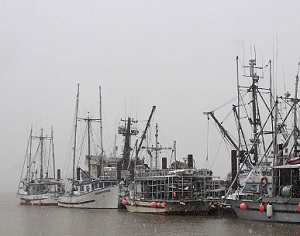
West Coast fishery appeals for aid but federal fisheries minister is missing in action
Commercial fishermen in B.C. are sending out an SOS following last year’s disastrous salmon season that has already sunk some boat owners. The union representing commercial fishermen says years of Department of Fisheries and Oceans (DFO) “mismanagement” pushed some commercial fishermen to the brink, and 2019 pushed them over. “Hundreds of fish harvesters are facing financial ruin after decades of fisheries regulation mismanagement,” said Joy Thorkelson, president of the United Fishermen and Allied Workers’ Union. >click to read< 09:19
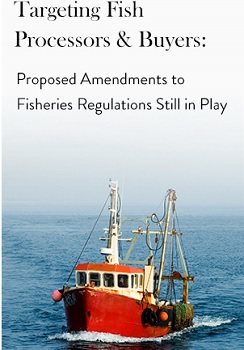
Proposed Fisheries Regulation Amendments Target Fish Processors & Buyers
The Fall 2019 re-election of the Liberal government means the proposed amendments to federal fisheries regulations remain a concern for industry participants.,, However, the government has, to date, not implemented the amendments. The proposed amendments target arrangements that transfer license rights and privileges from license holders to third parties. In the Statement, the Minister notes the perceived narrowness of the definition of “Controlling Agreement”,, McInnes Cooper has prepared this document for information only,, >click to read< 12:27
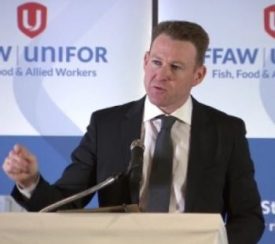
LETTER: Fish harvesters, plantworkers are stronger together
This letter is a response to Ryan Cleary’s letter “Single union can’t represent all sides of fishery” >click here<. Uniting workers in the fishing industry through a single union has delivered significant benefits to both fish harvesters and plant workers in the 50-year history of FFAW-Unifor and its predecessor unions. The only groups who do not support strong unions are the fishing companies we negotiate with, and Ryan Cleary and his group FISH-NL. by Keith Sullivan >click to read< 13:01
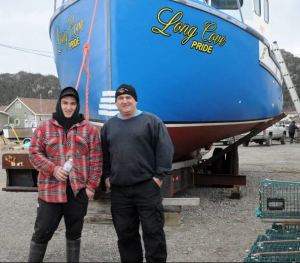
Little Port Harmon fish harvesters hoping for easterly winds
Renny Hickey and Dion Bennett, two fish harvesters out of Little Port Harmon in Stephenville, are wishing for strong easterly winds. That’s because St. George’s Bay is blocked up with the most ice that Hickey says he’s seen there in about 25 years, especially this late. Hickey said he learned Wednesday the crab season is opening this coming Monday and he’s waiting to go but can’t because of the ice in the bay. If the wind from the right direction doesn’t come up before that time, there’s no getting out.Then there’s the lobster season, tentatively set to open on April 18, and he certainly hopes the ice goes out into the Gulf of St. Lawrence before then. >click to read<09:39
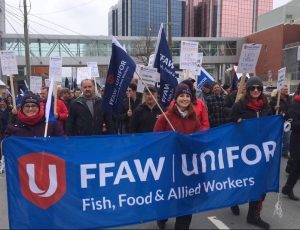
Fish harvesters, plants workers hold demonstration in St. John’s – ‘Put the crab back on the table,’ fishermen chant at rally
Fish, Food and Allied Workers’—Unifor members held a demonstration today at the Delta Hotel in St. John’s followed by a march through part of the downtown. Fish harvesters, plant workers and citizens attended united, the union says, in their concern for the future of the province’s fisheries. A news release stated that around the province, the Department of Fisheries and Oceans (DFO) shuts out fish harvesters from science processes and continues to make fisheries management decisions without any meaningful consultation with inshore harvesters. >click to read<13:14
‘Put the crab back on the table,’ frustrated fishermen chant at rally – >click to read<
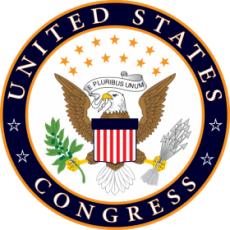
Fishing industry says no to net pen finfish
A group of fish harvesters and seafood industry entities is urging Congress to oppose attempts to legitimize open net pen finfish aquaculture, as proposed in fish farming legislation introduced in late September. The target of their Dec. 4 letter to Congress is the Advancing the Quality and Understanding of American Aquaculture Act, or AQUAA Act, introduced in September by Representatives Steven Palazzo, R-Miss, and Collin Peterson, D-MN. The House bill is a companion piece to legislation of the same name filed earlier in the year by Sen. Roger Wicker, R-Miss., to give the National Oceanic and Atmospheric Administration regulatory authority over fish farming in federal waters. >click to read<13:53
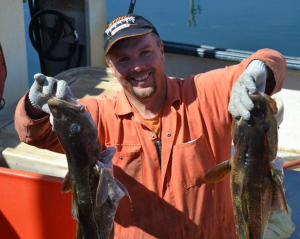
N.L. crab fishers taken aback by DFO’s latest details on crab data
Alfred Fitzpatrick says it seems the opinions of fish harvesters aren’t carrying much weight with the science branch of the Department of Fisheries and Oceans (DFO) as of late. “We always thought we had a pretty good relationship with DFO Science – when it come to crab anyways, cod is another story,” said the Garnish-based fishermen, who represents harvesters from the Burin Peninsula in crab fishing areas 10 and 11 on the Fish, Food and Allied Workers (FFAW-Unifor) union’s inshore council. “It seems like now it’s changing. It’s not a good working relationship, not as good anyway, I’ll say.” >click to read<16:10






